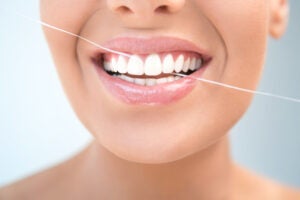-
Flu, Allergies, or Tooth Ache?

Woman unsure if she’s experiencing flu, allergy, or tooth ache symptoms.
Seasonal Health Dilemmas
Navigating the murky waters of cold weather ailments, many of us find ourselves puzzled: Is it the flu, allergies, or just a toothache? This confusion is not unfounded, as the symptoms of these conditions often overlap, affecting our oral health in unexpected ways.
The Flu and Oral Health
The common cold and the flu are notorious for causing discomfort beyond just a runny nose or a cough; they can also lead to tooth pain. This is primarily due to the close relationship between our sinuses and oral health. When we’re battling a cold or the flu, the inflammation in our sinuses can exert pressure on our dental nerves, particularly those near the upper teeth, causing a sensation that mimics tooth pain. This phenomenon, often mistaken for dental issues, is actually a side effect of our bodies fighting off the infection.
Medications and Oral Hygiene
Moreover, our oral health can take a hit during illness due to the medications we consume. Decongestants, while relieving nasal congestion, can lead to dry mouth by reducing saliva flow. Saliva is important for washing away food particles and bacteria, protecting our teeth and gums. A decrease in saliva can increase the risk of tooth decay and gum disease, exacerbating the sensation of tooth pain.
Allergies and Tooth Pain
Seasonal allergies compound this issue by affecting our oral cavity. Allergies can lead to sinus congestion and inflammation, putting pressure on our teeth and causing pain, particularly in the upper molars. This pressure is often due to the swelling of the sinus tissues, which, in turn, press against the roots of the teeth. The use of antihistamines, a common remedy for allergies, can also contribute to dry mouth, further increasing the risk of dental discomfort.
Maintaining Oral Health During Illness
Maintaining oral hygiene becomes even more crucial when we’re under the weather. Brushing, flossing, and staying hydrated can mitigate the effects of colds, the flu, and allergies on our oral health. However, distinguishing between a toothache caused by sinus pressure and one resulting from dental issues is essential. If tooth pain persists beyond the illness or is localized to one tooth, it may be time to consult a dentist.
Navigating Oral Health Through Seasonal Challenges
In conclusion, while the flu, allergies, and toothaches may present with similar symptoms, understanding their interconnections can help us better manage our health during these trying times. Regular dental check-ups, along with proper hygiene practices, can go a long way in keeping our teeth and gums healthy, regardless of the seasonal challenges we face.
Need assistance with a toothache?
Park 56 Dental has been the trusted solution in NYC since 1997. Our skilled team offers personalized care, from pediatric to sedation dentistry. Book a complimentary consultation today to address your sensitivity concerns and explore tailored treatment options. Experience comfort and convenience with our modern practice and comprehensive insurance coverage. Schedule your visit online or at 646-679-3973 now and start your journey to a sensitivity-free smile!
-
How To Beat Bad Breath

Young woman checking breath.
Bad Breath-Let’s Get Rid of It
Bad breath, sometimes known as halitosis, is a blight many people bear. But what causes it? And how can we get rid of it once and for all?
What Causes Bad Breath?
- Certain Foods-Although all foods can cause bacteria buildup and bad breath, onions and garlic cause bad breath in a different way. They are absorbed into the blood stream and sulfur compounds are released once they reach the lungs.
- Poor Dental Hygiene-This is the most common cause of bad breath. Food left on the teeth is a very quick way to not smell great.
- Illness-Kidney disease, acid reflux, advanced diabetes, liver failure, and infection are also common causes of bad breath.
How Can We Get Rid of Bad Breath?
- Good Dental Hygiene-We know this. Brushing, flossing, and tongue scraping are great ways to keep a clean mouth.
- Regular Visits to the Dentist-It is imperative to visit your dentist. If you are worried about your breath, ask your dentist to help. The dental team at Park 56 is happy to help with breath issues.
- Stay Hydrated-Water is so beneficial to the body. It can help flush the body of toxins and wash food particles off your teeth.
- Stay Away from Alcohol-Based Mouthwash-Although that first burst of freshness can feel great, alcohol-based mouthwashes can dry out the mouth and cause worse issues with breath. Try to find a hydrating mouthwash.
- Quit Tobacco-Cigarettes, smoke-free tobacco, pipes, ecigs, and cigars are all stinky. There is no type of tobacco that is safe to use. And it is all going to cause bad breath. Stay away.
- Drink in Moderation-Red wine has good bacteria that can help reduce breath issues. One glass is fine. There are other types of alcohol that contain good bacteria. But for the most part, drinking is not good for your breath. Try to stick to a drink or two, a couple times a week. This way you won’t wreck your dental health and your breath will stay fresh.
Some Quick Remedies for Bad Breath
- Citrus-These delicious fruits are refreshing and can clean the teeth. Just don’t go crazy with lemons. They can be a little too acidic if not consumed in moderation.
- Milk-A glass of milk can cut down on onion or garlic breath.
- Apples-We all know that an apple a day keeps the doctor away. It can help keep you from dental issues, too. Apples are great at quickly cleaning the teeth.
- Yogurt-There are healthy bacteria in yogurt that can actually combat the harmful bacteria that causes bad breath.
- Parsley and Fennel-Certain herbs can combat bad breath when chewed.
- Sugar-Free Gum-Many dentists recommend chewing a piece of sugar-free gum if you don’t have the time to brush and floss between meals.
Park 56 Dental
When you are looking for the best advice about how to keep a healthy mouth and great smelling breath, the best place in New York is Park 56 Dental. Voted the number one dentist in the New York area, we have everything you need for perfecting that beautiful smile. For more information about dental services, to book an appointment, or to ask any questions about your teeth, visit our website or give us a call at (646) 679-3973. -
The Benefits of Good Oral Hygiene Habits

Young woman with good dental hygiene habits.
We know a lot about the fact that it’s important to keep a clean mouth. We also know that the way to a clean mouth is by brushing, flossing, and regular dental visits. What are the reasons we want to keep a clean mouth? Here are some facts about oral hygiene, including some tips you may not have known about keeping those pearly whites nice and healthy!
- Keeping Your Teeth
This one may seem obvious, but some people don’t realize how easy it is for teeth to fall out of an unhealthy smile. It’s not only tooth decay, but there are other ways you can easily lose teeth. Gum disease is another way that teeth can fall out. We need our teeth to enjoy those delicious, healthy foods. Not only that, those who keep all of their teeth for life are likely to live longer than those without all of their 20 teeth. So do your best to keep a clean mouth and healthy teeth. - Lowers Risk of Sickness and Disease-This is a big one. Did you know that keeping your teeth clean can greatly reduce your risk of serious illness? It’s a fact. Here are some facts about disease that you maybe didn’t know.
- Covid-Recent studies have shown that keeping your mouth clean can reduce your risk of suffering a fatal outcome from covid. Keep your mouth clean and reduce your risks.
- Heart Disease-Gum disease and periodontal disease have been linked to heart disease according to the CDC. It is theorized that bacteria from the gums enter the bloodstream and affect the cardiovascular system.
- Cancer-As if that weren’t enough, gum disease has been linked to certain cancers as well. In fact, those with gum disease are 14% more likely to experience some form of cancer in their lifetime. Those with gum disease are more likely to develop gall bladder cancer, breast cancer, esophageal cancer, and skin cancer.
- Dementia-Another big one, this one is hard to hear. But there is a 70% greater chance of developing dementia for someone who has unhealthy gums than for someone who has healthy gums. Gum disease is a very serious affliction.
- Having a Healthy Baby
Moms who have healthy mouths are much less likely to have premature babies or babies with low birth weight. If you are pregnant, keep those teeth nice and clean and you will increase your beautiful baby’s chance at a healthy birth. - Staying Gorgeous
Keeping all your teeth means you’re just one step closer to lifelong beauty. Regular brushing, flossing, and dental exams will help you keep the wonderful smile you were born with and that is very important. Whether it’s a first date, a job interview, or your first day at college, having a healthy and attractive smile means you’re able to put your best foot forward in every situation.
Park 56 Dental
When you are looking for the best advice about how to keep a healthy mouth and a healthy body the best place in New York is Park 56 Dental. Voted the number one dentist in the New York area, we have everything you need for perfecting that beautiful smile. For more information about or to ask any questions about your teeth, visit our website or give us a call at (646) 679-3973. - Keeping Your Teeth
-
The Impact of Lifestyle On Your Dental Health

Eating well for healthy teeth.
How Lifestyle Impacts Your Dental Health
We are all constantly trying to improve our lifestyle choices. The focus on health is one that is unprecedented in prior generations. We work out, eat right, and even try to exercise our brains. How do these lifestyle choices affect our dental health? Here are some ways.
- Dietary Choices
We’ve all heard that you are what you eat. Your teeth are also a reflection of what you are putting in your body. When you eat foods that are high in sugar for example, you are very likely to suffer from tooth decay. If you consume acidic beverages, you may have damage to the enamel of your teeth. Eating a diet rich in vitamins and minerals includes foods like lean proteins, fruits, and vegetables. In addition, calcium rich foods are important to consume for optimal dental health. All dairy products contain calcium which is essential to healthy teeth and bones. - Tobacco Use
How many more ways can we say this? Tobacco use is the worst thing you can do for your health and therefore it’s also the worst thing you can do for your teeth. Smoking stains the teeth, causes bad breath, causes gums to recede, and can even cause tooth loss. Just don’t do it. No tobacco use, please. - Alcohol consumption
Alcohol consumption is ok in moderation. However, alcohol use can cause dehydration and that can mean dry mouth. When saliva flow is reduced the mouth becomes a breeding ground for bacteria. This means that tooth decay is imminent. So, if you do drink, make sure to hydrate. And please don’t combine alcohol with tobacco. This increases the negative effects of both. - Hydration
On that note, let’s talk hydration! Keep the H2O flowing, and you will slowly be removing food and debris from the mouth between brushing. Not only that, drinking water increases the flow of saliva in the mouth and saliva protects the teeth and helps clean the mouth by breaking down particles and bacteria. - Stress
Being stressed alone has little effect on your teeth. However, people under stress usually clench their jaw or grind their teeth. The person who does this is usually not even aware it is happening. This means that teeth could be suffering damage while we sleep. Try meditative exercises and try to keep stress to a minimum. - Regular Dental Checkups
It’s essential to your dental health that you regularly visit your dentist. From regular dental cleanings to x-rays and regular exams, you can’t go wrong having regular dental cleanings and checkups. In fact, you can ask your dentist for more tips on a healthy lifestyle that promotes a healthy smile.
Park 56 Dental
When you are looking for the best advice about how to keep a healthy mouth, the best place in New York is Park 56 Dental. Voted the number one dentist in the New York area, we have everything you need for perfecting that beautiful smile. For more information about keeping good oral hygiene habits to promote a healthy lifestyle or to make an appointment, visit our website or give us a call at (646) 679-3973. - Dietary Choices
-
Everything You Need To Know About Dental Implants

Young woman confident about her smile.
What are Dental Implants?
Whether you’re talking about veneers, bridges, or crowns, dental implants are prosthetic teeth that are permanently secured into the mouth. They are a great solution for people who have one or more missing teeth.
The bottom line is that if you have missing teeth, they must be replaced as soon as possible. It is essential to have all your teeth. If one tooth goes missing, your bite will be compromised, and more teeth could suffer from that misalignment. Not only that, a missing tooth is unsightly. Let’s go over all the information concerning dental implants.
What are Implants Made Of?
Dental implants are created using ceramic and metal together to craft a tooth that looks nearly identical to the original tooth. A dentist can craft teeth out of these materials and even match the color of your other teeth. Some dental implants are made from titanium or zirconium oxide. Some implants are made of gold alloys, or cobalt-based alloys.
Implants are made of three parts:
- Implant Body: This is a piece made of metal that is screwed into the gums and fixed to the jaw.
- Abutment: An abutment is fixed into the screw and is meant to secure the new prosthetic tooth.
- Crown: The crown is the ceramic and metal piece that fits onto the abutment. This is what will look exactly like your old tooth.
Are You a Candidate for Implants?
You may be a candidate for dental implants. There are many factors that will affect your candidacy. These factors include:
- Are you missing at least one tooth?
- Are you healthy enough for surgery?
Receiving implants means going under sedation and it requires oral surgery. If your body isn’t healthy enough for surgery, you are not a candidate for dental implants. - Did you lose your tooth or teeth due to gum disease? If the answer to this question is yes, you aren’t a candidate for dental implants. But never fear! If you get that gum disease under control, you will be able to eventually be a candidate for dental implants.
What are the Pros and Cons of Dental Implants?
Pros:
- Appearance-Cosmetically, implants are likely to look more like your original teeth. This is why some people prefer them to dentures or just leaving the tooth missing.
- Keeps the surrounding bone and gums healthy-When you lose a tooth and receive a dental implant, the surrounding teeth, jaw, and gums recognize it and don’t wither away, like they would do if you left the space empty.
- Keeps nearby teeth stable-nearby teeth are less likely to shift when there is a replacement tooth.
- The ability to chew is preserved-This is the most practical reason to get dental implants.
Cons:
There are no real cons to getting dental implants. There are however some risks involved.- Possible harm to surrounding teeth during insertion.
- Shifting of teeth or changes to bite.
- Implant failure-sometimes the implant doesn’t work like it should or it comes out.
- Gum damage-Dental implants can sometimes cause gums near the tooth to become less healthy tissue.
- Issues with cleaning around implant, possibly leading to the loss of other teeth.
- Numbness after surgery
Conclusion:
Dental implants can be a wonderful solution to a missing tooth or missing teeth. They are a particularly positive choice for someone who has one to several missing teeth, but not completely missing teeth. They can boost confidence, improve bite, and complete your smile.
Park 56 Dental
If you are thinking about dental implants or other dental procedures, the best place in New York is Park 56 Dental. Voted the number one dentist in the New York area, we have everything you need for perfecting that beautiful smile. For more information about dental implants or to ask any questions about your teeth, visit our website or give us a call at (646) 679-3973. -
The Hidden Dangers of Not Addressing Dental Problems

Woman addressing dental issues.
Taking care of our oral health seems like a basic task that most of us brush off as unimportant. But did you know that the health of your mouth and teeth is intricately connected to the health of your entire body? It is true- dental problems can cause serious, sometimes lethal, health issues. In this blog, we will discuss how neglecting dental problems can lead to severe health concerns and how to prevent them.
How Are Oral and Systemic Health Connected?
The truth is that your mouth is a prime entry point for bacteria and germs. These harmful microorganisms can infiltrate your bloodstream, creating health problems in your body. In fact, according to the American Dental Association, studies have shown that there is a link between stroke, diabetes, heart disease, preterm labor and birth weight, and bacterial infections that start in the mouth.
Your Immune System
A robust immune system is pivotal in fighting pathogens and infections that may be present in our bodies. By neglecting dental problems, we weaken our immune system, which exposes us to dangerous diseases and health issues. Poor oral health can strain our immune system, leaving it less equipped to fight off harmful invaders like bacteria or viruses.
Inflammation
Stress, unhealthy diets, and infections in your gums and teeth can cause inflammation throughout your body. Inflammation is the body’s natural response to injury or infection. However, chronic inflammation is harmful and can lead to bigger health issues such as cancer, heart disease, stroke, and diabetes, to name a few. The link between oral health and inflammation makes it crucial to take care of our dental issues, both big and small.
The Stages of Gum Disease and Its Threat to Overall Health
Gum disease, also known as periodontal disease, is a serious problem that affects the soft tissue and bone that supports your teeth. Gum disease is prevalent, affecting nearly half of adults over the age of 30 in the United States, according to the Centers for Disease Control and Prevention (CDC). While many may think gum disease is just a minor dental issue, it can cause significant health problems if left untreated. Gum disease can lead to tooth loss, chronic bad breath, and has links to heart disease, stroke, and diabetes.
How to Practice Preventive Dental Care and Why
The best way to avoid the dangers of neglected dental problems is to practice preventative dental care. Regular brushing and flossing, cleaning your tongue, maintaining a healthy diet, and visiting your dentist at least once a year can prevent dental problems from occurring. Brushing and flossing help remove plaque that can cause cavities, gum disease, and bad breath. Regular visits to your dentist enable them to detect and treat any oral health issues, prevent tooth decay, and gum disease, prevent oral cancer, and keep your teeth and gums healthy.
Make an Appointment Today with Park 56 Dental
It is imperative to take good care of your teeth to avoid any dental problems that could lead to significant health issues. By brushing and flossing regularly, eating a healthy diet, and visiting your dentist regularly, you can help reduce the risk of alarming health problems. At Park 56 Dental, our team of experts is committed to helping you maintain your optimal oral health. Contact us today to schedule your consultation.
-
Dental Care for Seniors: Addressing Age-specific Oral Health Challenges

Senior couple brushing their teeth.
As the population continues to age, dental professionals are faced with unique challenges when caring for older patients. Aging comes with a plethora of physical changes and medical conditions that can complicate oral health, making it critical to address age-specific challenges. This article will provide insight into the common oral health challenges that seniors face and how dental professionals can effectively address them.
Physical and Health Comorbidities
As individuals age, it’s not unusual for them to face certain health conditions like hypertension and diabetes. This can lead to a weakened immune system, making seniors more susceptible to oral diseases. Dental professionals take note of these concerns when treating older adults. They understand that seniors may not be able to handle invasive procedures like dental extractions or root canals due to their health situation.
Medication Use
The average senior adult is most likely using at least one prescription medication in addition to several over-the-counter drugs. Because of this, dentists ask patients to report all medication use so that they can ensure they safely administer drugs like local anesthetics and analgesics. Some medications can cause dry mouth and other oral health conditions that your dentist will need to address.
Physical Sensory and Cognitive Impairment
Like every other medical condition, aging can bring about physical, sensory, and cognitive impairments that can make oral healthcare challenging. Physical impairments, such as arthritis, can often make handling a toothbrush, floss, or dentures difficult. Some seniors may also experience sensory impairments like blindness or hearing loss, which hampers communication. Cognitive impairments such as dementia also make it critical for caregivers or family members to be present to ensure their dental care is proper and effective.
Dental Conditions that Include Dry Mouth
Dry mouth or xerostomia is typical among aging adults and can lead to tooth decay, gum disease, and other oral health issues. Dental professionals take dry mouth seriously and can help them ascertain if medications cause dry mouth and how to take appropriate action.
Coronal Caries and Periodontitis
Older adults with coronal caries and periodontitis are more likely to have complex dental needs and limited access to care. This is due to the comorbid health condition, physical impairments, and fear of dental procedures. Pathologies like periodontitis need to be addressed by dental professionals to reduce the risk of tooth loss, which can lead to other serious health problems.
The Team at Park 56 Dental is Equipped for All Your Dental Needs—Whatever Your Age!
At Park 56 Dental, we take a personalized approach when caring for older adults. We understand that effective communication, routine dental exams, and preventive oral care measures are vital to maintaining oral health. Additionally, we create treatment plans that factor in comorbid health conditions, medication use, physical impairments, and cognitive and sensory impairments to achieve optimal healthcare outcomes for seniors. By understanding and addressing age-specific oral health challenges, our team can positively impact the quality of life of our aging patients. Contact us today to schedule an appointment!
-
Warning Signs of Tooth Decay

Man checking for signs of tooth decay.
Tooth decay is a common problem that can occur due to various factors, including poor oral hygiene, unhealthy dietary habits, and certain medical conditions. Even though tooth decay may seem like a minor issue, if left untreated, it can lead to severe dental complications, such as infection, gum disease, and tooth loss. Therefore, it’s essential to be aware of the warning signs of tooth decay and seek professional dental help as soon as possible. In this blog post, we will discuss the eight warning signs of tooth decay that you should never ignore.
Toothache
One of the most common warning signs of tooth decay is a toothache. If you experience pain in your teeth or gums, it could indicate that the decay has advanced and reached the inner part of your tooth, where the nerves and blood vessels are located. The pain can be continuous or intermittent, and it may worsen when you bite or chew.
Tooth Sensitivity
If you have a sudden sensitivity to hot, cold, or sweet foods and drinks, it may be a sign of tooth decay. Tooth sensitivity occurs when the enamel layer, which is the outermost layer of your teeth, is damaged or worn down. Without proper treatment, the decay can penetrate the dentin layer, which is softer and more sensitive, and cause more severe pain and sensitivity.
Bad Breath
Bad breath, or halitosis, is a common symptom of tooth decay. The bacteria that cause decay produce a foul odor that can linger in your mouth, even after brushing and flossing. If you notice persistent bad breath, it’s essential to schedule a dental check-up to determine the underlying cause.
Discoloration
Discoloration or dark spots on your teeth can be a sign of tooth decay. As the decay progresses, it can leave visible marks on your teeth, making them appear yellow, brown, or black. Discoloration can also be a sign of other dental problems, such as cavities, tartar buildup, or gum disease, so it’s crucial to have it evaluated by a dentist.
Pits or Holes
Cavities are a form of tooth decay that can cause pits or holes in your teeth. If you notice small depressions or pits in your teeth, it’s likely that you have a cavity. Cavities can cause various dental complications, including toothache, sensitivity, and infection, so it’s crucial to get them treated as soon as possible.
Cracks or Chips
If your teeth are chipped or cracked, it can make them more vulnerable to decay. Cracks and chips can also expose the inner layers of your teeth to bacteria and food particles, leading to infection and decay. If you have any cracked or chipped teeth, it’s essential to get them evaluated by a dentist.
Loose or Shifting Teeth
If your teeth feel loose or shift out of place, it may be a sign of advanced tooth decay. When decay reaches the roots and supporting structures of your teeth, it can weaken them and cause them to loosen. If left untreated, the decay can lead to tooth loss and other dental complications.
Swollen or Bleeding Gums
Swollen or bleeding gums are common symptoms of gum disease, which is often caused by tooth decay. When decay-causing bacteria accumulate on your teeth and gums, they can cause inflammation, bleeding, and infection. If you notice any swelling or bleeding in your gums, it’s crucial to schedule a dental check-up as soon as possible.
Schedule a Dental Exam Today with Park 56 Dental
Tooth decay is a dental problem that shouldn’t be ignored. By being aware of the warning signs of tooth decay, you’ll be able to catch problems early on before they become too severe. If you’re experiencing any of the symptoms mentioned in this post, don’t hesitate to schedule an appointment with Park 56 Dental in New York. Our experienced dental team will provide you with the best possible care to ensure that your teeth remain healthy and strong. Remember, prevention is always better than cure!
-
Why it’s Important to Maintain your Gum Health

Woman flossing teeth.
Welcome to the Park 56 Dental blog, where we believe that a healthy smile starts with healthy gums! As specialists in dental care, we understand the vital role that gum health plays in maintaining overall oral health. While often overlooked, your gums provide the foundation for your teeth, ensuring they stay securely in place and function properly. In this blog post, we will be delving into why it is so crucial to prioritize gum health and the various steps you can take to keep your gums in excellent condition. No matter your age or current oral health status, we hope you find the information shared here helpful and empowering to take charge of your gum health. Let’s get started on this journey towards a vibrant and healthy smile that starts from within!
Warning Signs of Tooth Decay
Tooth decay is a common problem that results from bacteria in your mouth producing harmful acids that erode your enamel. But did you know that one of the earliest warning signs of tooth decay is actually gum problems? As the bacteria spreads, it can cause your gums to become red, swollen, and prone to bleeding. This is a sign that you should schedule a cleaning with your dentist as soon as possible.
Dental Care for Seniors: Addressing Age-specific Oral Health Challenges
As we age, our dental needs change. Seniors are more likely to suffer from gum problems due to some of these common problems/triggers:
- Dry Mouth: One of the most common oral health issues that seniors face is dry mouth. This is often caused by medications that reduce salivary flow or medical conditions such as Sjögren’s syndrome. Dry mouth can cause a range of problems, including tooth decay, gum disease, and oral infections.
- Gum Disease: Seniors are at an increased risk of developing gum disease, which is caused by a buildup of bacteria in the mouth. Gum disease can lead to tooth loss and other health problems, including heart disease and stroke.
- Tooth Loss: As we age, our teeth may begin to wear down, crack, or decay. Eventually, tooth loss may occur. Missing teeth can cause difficulty eating and speaking and may even lead to bone loss in the jaw.
- Oral Cancer: Seniors are at an increased risk of developing oral cancer, particularly if they smoke or use tobacco products. Oral cancer can be difficult to detect in its early stages, which is why it is important for seniors to receive regular oral cancer screenings.
- Medication Side Effects: Seniors may take a range of medications to manage medical conditions, and some of these medications can cause side effects that affect their oral health. For example, some medications can cause dry mouth, while others can cause gum inflammation or mouth sores.
The Hidden Dangers of Not Addressing Dental Problems
Gum disease doesn’t just affect your mouth. Studies have found that people with gum problems are more likely to develop heart disease, stroke, and other systemic conditions. This is because the bacteria that cause gum disease can enter your bloodstream and spread to other parts of your body, including your heart and lungs. That’s why it’s crucial to address gum problems early on to avoid these serious health risks.
Simple Ways to Prevent Gum Disease
Preventing gum disease doesn’t have to be difficult. By following a few simple steps, you can keep your gums healthy and your smile bright. First, make sure to brush your teeth twice a day with fluoride toothpaste. Second, floss each day to remove plaque and bacteria from between teeth and along the gumline. Finally, make sure to visit your dentist regularly for cleanings, exams, and x-rays. Taking these steps can go a long way toward avoiding gum disease and other dental problems.
Reach Out to Park 56 Dental Today with Any Questions
Keeping your gums healthy is a vital part of maintaining good oral health and avoiding serious medical problems. If you’re experiencing gum disease symptoms such as bleeding, redness or swelling, consult your dentist right away. At Park 56 Dental, we offer a full range of preventative and restorative services designed to keep your gums and teeth healthy for life. To schedule an appointment, call us at (212) 826-2322 today.
-
Five Big Ways to Improve Your Dental Health in 2024

Getting healthier teeth in 2024.
Your smile is the first thing people see when they meet you! First impressions are important so here are some ways to improve that smile. Follow these tips and you will be the one who sparkles when you walk in the room.
1.Practice Good Oral Hygiene
Seems like a no brainer, but there are many details in your brushing routine that you could be doing wrong.
- Brush at least twice a day -Brushing regularly is key. Make sure you are cleaning those pearly whites more than once a day.
- Labels-First check your label and make sure that your toothpaste has fluoride in it. Fluoride is very important for keeping teeth strong. It can actually work through remineralization which is the regrowth of a partially decayed tooth.
- Floss-Brushing your teeth doesn’t complete the job. Make sure you floss, too!
2. Please do not use Tobacco and Limit Alcohol
Tobacco is so last century. If you smoke, please quit. All tobacco use is absolutely terrible for your dental health.
If you drink, try to limit your alcohol to occasional usage. Alcohol can have a major impact on your dental health. Alcohol consumption can increase bacteria and cause tooth decay. It’s also full of sugar. So this New Year, 2024, dentists recommend cutting your alcohol consumption in half.
3. Stay Hydrated
Studies show that staying hydrated is a great way to improve your breath. It helps with saliva production as well. Good hydration can even help remove bacteria or bits of food that could be lingering after a meal if you haven’t had time to brush.
4. Eat Healthy Food
Not only do those crunchy, delicious fruits and veggies help clean your teeth, they also provide essential nutrients for a healthy smile. From apples and carrots to eggs and milk, all of these healthy dietary choices are key in giving you that healthy smile by providing the vitamins and minerals you need.
Ask your dental healthcare provider for more tips on foods with great nutrients for good dental health. There are delicious options out there!
5. Schedule Routine Dental Check-Ups
The best way to stay on top of things in 2024 is to get it all scheduled. Get those dental visits in your planner! If you want to make sure your dental health is the best it can be, make sure you are seeing your dentist regularly throughout the new year! This means every six months.
Wishing you all the best and especially a gorgeous and healthy smile in 2024!
Park 56 Dental
Interested in chatting more about how to improve your dental health in 2024? Park 56 Dental is the way to go! Voted #1 in New York City, the dentists at Park 56 Dental have the answers! Park 56 Dental is known for great dentistry. We provide the best treatments in town from pediatric dentistry to endodontics, oral surgery to prosthodontics, emergency to sedation dentistry. You and your family can count on us to make you feel welcome and comfortable at each visit! Be sure to visit our website or if you’d like to make an appointment, click here to book online or call (646) 679-3989.
RECENT POSTS
categories
- Uncategorized
- Cosmetic Dentistry
- Veneers
- Healthier Teeth
- Teeth Whitening
- Dental Health
- Video
- Dental Emergencies
- Invisalign
- Dental Implants
- Root Canal
- Sedation Dentistry
- Infographic
- Dental Crowns and Bridges
- Dental Anxiety
- Gum Disease
- COVID-19
- Bad Breath
- New York Dentist
- Cut out sugar
- General Dentistry
- Oral Health
- Oral Cancer
- Dry Mouth
- Gum Health
- Toothache
- Dental Sealants
- Cavities



